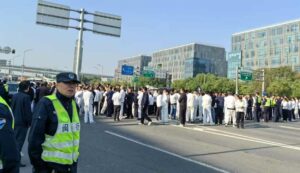Workers at an automotive trim company in Shanghai protest plans for widespread layoffs
China: In protest of plans for mass layoffs, hundreds of workers at an automobile trim firm in Shanghai blocked a key roadway in the city. Workers at the state-owned Shanghai Guoli Automotive Leather Decoration Co. on Wednesday, according to a report by Radio Free Asia.

fought with police as traffic jammed the Husong Highway; social media users posted video of the altercation. Other employees yelled and joined the confrontation when the cops arrested at least one worker.
The demonstrations started after workers were notified on October 9 that anybody who voluntarily quit would get a severance payment equal to three months’ minimum salary, or 8,070 yuan (about USD 1,113).
The “voluntary resignations” were not really voluntary, according to social media postings made by people posing as firm workers. According to a citizen journalist on X, “Mr. Li is not your teacher,” the corporation had called the layoff offer “generous.”
Employees contended that, given their average salary over the previous 12 months, they should be compensated for three months.
In the midst of China’s faltering post-lockdown economy, this issue is one of an increasing number of conspicuous labor disputes. According to a quarterly study from Washington, DC-based Freedom House, the number of protest events increased by 27% between July 1 and September 30.
Consumer and investor demonstrations about the weak economy have increased, according to the China Dissent Monitor, which keeps tabs on such incidents. Nearly 40% of these rallies demand government involvement, the survey also said, despite the fact that many complaints are related to the conduct of private enterprises.
On Wednesday, a representative of the local Qibao township government’s complaints section revealed that there had been disputes between the Shanghai plant’s employees and their boss since October.
According to a spokesperson of the Qibao township police department, the only reason authorities would intervene in the labor issue is to stop individuals from blocking the roadway. The leader of the official Shanghai Federation of Trade Unions’ chapter at the plant, Song Baowei, told Radio Free Asia that the union is presently investigating the reasons for Wednesday’s demonstration.
Workers’ primary complaints in recent interviews with RFA were often poor pay, excessive hours, and a lack of channels for defending their rights. A major problem, according to labor advocates, is that corporate China lacks a robust contractual responsibility culture and a reliable framework for settling labor disputes.
In China, the government controls all recognized trade unions, and workers who form via unofficial unions are often suppressed by the government using force. Over the last month, hundreds of rallies have taken place nationwide, mostly led by workers demanding unpaid pay, according to the Hong Kong-based non-profit China Labour Bulletin.
Wuhan had a large-scale protest by construction workers on Tuesday for unpaid pay, while Hangzhou saw a similar demonstration by dozens of workers at a clothing business on Monday. The Bulletin’s Strike Map, which uses web sources to follow labor problems across China, included these occurrences.
On November 16, delivery workers in Guangdong province demonstrated against their underpaid salaries in video footage that was uploaded to the video-sharing website Douyin. China saw a spike in strikes and demonstrations in the first half of 2024, with more than 719 collective actions documented between January 1 and June 30, according to the Bulletin’s Strike Map.
Approximately 800 results were returned on Friday from a search for labor disputes during the previous month, suggesting that industrial confrontations are still on the increase. According to a story from the Bulletin dated September 19, workers in the automobile industry have been protesting more and more about the decrease of working hours and the nonpayment of economic compensation.
According to the research, a large number of manufacturers in the industry are terminating employees who are hesitant to move and are looking for methods to avoid fulfilling their contractual obligations. “To evade compensation, some companies shut down operations without officially closing the factory and pressured workers into resigning voluntarily,” said the study.





